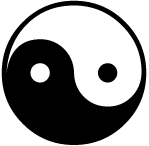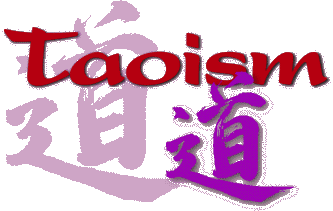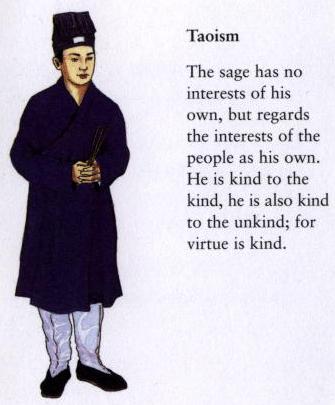While
historians can determine when the Confucian philosophy arose, it is not
so easy to pinpoint the origin of Taoism. This is largely in part
because the history of Lao Tzu, one of the founders and great teachers
of Taoism, is somewhat of a mystery. The legend of Lao Tzu says that
he was born in 604 B.C. after,"been conceived some sixty-two years before...he
was born. (Welch, 1) It is also said that he lived to be nearly two hundred
years old. It can be determined that Lao Tzu lived during the Eastern
Zhou, and like Confucius, watched his society crumble. It cannot
be known to what extent he witnessed this, since the exact years that Lao
Tzu lived are a mystery. It is also unknown as to exactly when he
wrote the Tao Te Ching, one of the most important Taoist texts.
It is also important to recognize that Taoism changed significantly over
the years and that later forms are substantially different from one another.
The two most
important early Taoist philosophers were Lao Tzu and Chuang Tzu.
They taught that the goal of each person should be to live the Tao, something
that cannot be defined by words but can only be experienced. Lao
Tzu stressed the importance of wu-wei in the Tao Te Ching.
Wu-wei has become known in the west to mean inaction. This
was Lao Tzu’s resolution to life and that action does not bring us close
to our goals. Along with inaction comes indifference. If one
has no concept of good or beauty, then that person can have no concept
of what is evil or ugly. He taught that each person needs to uneducate
themselves and return to nature, for only then will they gain knowledge.
He argued that all humans have an interdependent relationship with nature.
Everything in the world has ch’i -- an energy force that flows through
it. The
ch’i
is very important in Taoist thought because it
is the power that drives each human being. While Lao Tzu wrote some
of the most important concepts of Taoism, it is not to be mistaken that
he was the only founder of the philosophy.
Chuang Tzu
is the author of the other great Taoist text, the Chuang Tzu.
Herrlee Creel’s interpretation of the Chuang Tzu helps westerners
understand the Tao. He states, “the tao is not merely a substance
and a thing. It is the only substance and the only thing, for it
is the totality of all things whatsoever...it is absolutely indivisible.”
(Creel 2-3) Along with Lao Tzu, Chuang Tzu’s text also deals with the strong
ties that each person has with everything surrounding them. All things
of the earth are interrelated like pieces of one giant puzzle. It
is this notion that helps Taoists be able to interact with people within
society in a peaceful manner, because they believe that all things that
occur, whether good or bad, affect all of the people. While he stresses
the importance of nature, he also teaches that persons should act in accord
with their own nature. With that in mind, Chuang Tzu does not grieve
over death because it is a part of human nature. All enlightened
Taoists would accept death for precisely that reason. Later, towards
the end of the Han dynasty, Taoists have a very different approach to death,
which will be discussed below.
 With
all parts of the world working together, another key concept of Taoism
arises- the yin and yang. The yin and yang is the symbol used to demonstrate
the attraction of opposites in Taoism. The two pieces fit together
to form a whole and help balance one another. Two examples of opposites
that the yin and yang represent are: fire and water; man and woman.
This is used to describe all things in nature as well as human action.
No two people have the exact same perspective on anything, and it is opposite
perspectives that balance the world. It is a very appropriate symbol
to be identified with all forms of Taoism, because the yin/yang symbol
and the world are both puzzles and if any of the pieces are missing neither
can have a whole. With
all parts of the world working together, another key concept of Taoism
arises- the yin and yang. The yin and yang is the symbol used to demonstrate
the attraction of opposites in Taoism. The two pieces fit together
to form a whole and help balance one another. Two examples of opposites
that the yin and yang represent are: fire and water; man and woman.
This is used to describe all things in nature as well as human action.
No two people have the exact same perspective on anything, and it is opposite
perspectives that balance the world. It is a very appropriate symbol
to be identified with all forms of Taoism, because the yin/yang symbol
and the world are both puzzles and if any of the pieces are missing neither
can have a whole.
While
the yin/yang symbol can be associated with all forms of Taoism, it is appropriate
to note the differences of these forms. Over time followers of Taoism
began to focus on the different aspects of the philosophy leading to three
major sects: philosophical, organic, and religious. Philosophical
Taoism is the sect that most relates to the teachings of Lao Tzu and Chuang
Tzu. Taoists that became hermits would more than likely fall into
this class. The goal is to obtain knowledge by reverting back to
nature in order to live the fullest life. This is how they believe
they can experience the Tao. This is also working with the
notion to conserve their te (power) and use it to its fullest advantage
while wasting none. The concept of wu-wei is very important
for these philosophical Taoists because inaction will deter them from wasting
their te.
The
use of te is what most separates philosophical Taoists from organic
Taoists. Organic Taoists do not try to just use their te effectively
and efficiently, but rather they try to maximize it in order to gain immortality.
These Taoists are also the ones who search for medical herbs in order to
prolong life. This is a significantly different from the philosophical
Taoists approach to death, for it has been noted that Chuang Tzu’s teachings
lead the people to accept death as a part of their nature. According
to theologian Huston Smith, this search for immortality is not for selfish
reasons, but rather, “Their ubiquitous social concern led them to press
the possibility that the ch'í... could be transmitted psychically
to the community to enhance its vitality and harmonize its affairs” (Smith,
202).
Organic and
philosophical Taoism may have their differences but they both relate to
the individual. Religious Taoism, however, pertains to groups, and
was greatly influenced by the practices of Buddhism. Taoism became
institutionalized around the 200 A.D. (Smith, 205). Just like other
religions, Taoism now had incorporated gods, clergy, and temples to help
Taoists practice their beliefs. Smith states that these Taoist schools
were, “crammed with rituals that, if exactly performed, have magical effects”
(Smith, p. 205). While this is great change to society, Taoism affected
China in more ways than just being another religion for the people.
|
 Chinese civilization has gone through many phases over the thousands of
years of its existence, with one of the more glorious times being the Western
Zhou. Political stability and social harmony brought peace to a semi-united
China. With the decline of the Western Zhou came the decline of Chinese
society, sparking new ideas on what way of life would lead to more prosperous
times. Daoism was one of these new philosophical ideas. Although
the history of Daoism is filled with mystery, its teachings were able to
spark great change in Chinese culture and society, and have continued to
influence the modern world with its strong attachment to the importance
of nature in each person’s life. Taoism has proven to be a timeless
philosophy appealing to people of all eras and societies. The two
great Daoist teachers, Lao Tzu and Chuang Tzu, looked to help shape their
decaying society, and though their teachings were modified over the years
they influenced the forming of a religion, created a new art form, and
the concept of feng shui, in which people try to focus the energy
of their life into their own homes.
Chinese civilization has gone through many phases over the thousands of
years of its existence, with one of the more glorious times being the Western
Zhou. Political stability and social harmony brought peace to a semi-united
China. With the decline of the Western Zhou came the decline of Chinese
society, sparking new ideas on what way of life would lead to more prosperous
times. Daoism was one of these new philosophical ideas. Although
the history of Daoism is filled with mystery, its teachings were able to
spark great change in Chinese culture and society, and have continued to
influence the modern world with its strong attachment to the importance
of nature in each person’s life. Taoism has proven to be a timeless
philosophy appealing to people of all eras and societies. The two
great Daoist teachers, Lao Tzu and Chuang Tzu, looked to help shape their
decaying society, and though their teachings were modified over the years
they influenced the forming of a religion, created a new art form, and
the concept of feng shui, in which people try to focus the energy
of their life into their own homes.
 With
all parts of the world working together, another key concept of Taoism
arises- the yin and yang. The yin and yang is the symbol used to demonstrate
the attraction of opposites in Taoism. The two pieces fit together
to form a whole and help balance one another. Two examples of opposites
that the yin and yang represent are: fire and water; man and woman.
This is used to describe all things in nature as well as human action.
No two people have the exact same perspective on anything, and it is opposite
perspectives that balance the world. It is a very appropriate symbol
to be identified with all forms of Taoism, because the yin/yang symbol
and the world are both puzzles and if any of the pieces are missing neither
can have a whole.
With
all parts of the world working together, another key concept of Taoism
arises- the yin and yang. The yin and yang is the symbol used to demonstrate
the attraction of opposites in Taoism. The two pieces fit together
to form a whole and help balance one another. Two examples of opposites
that the yin and yang represent are: fire and water; man and woman.
This is used to describe all things in nature as well as human action.
No two people have the exact same perspective on anything, and it is opposite
perspectives that balance the world. It is a very appropriate symbol
to be identified with all forms of Taoism, because the yin/yang symbol
and the world are both puzzles and if any of the pieces are missing neither
can have a whole.
